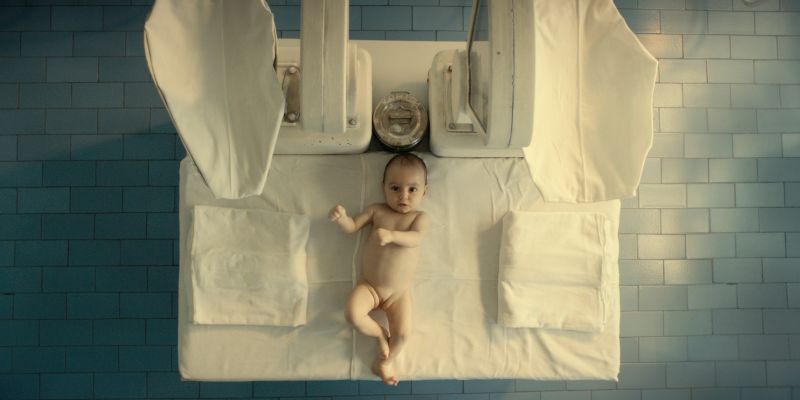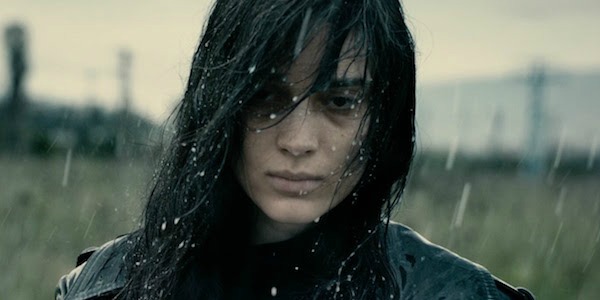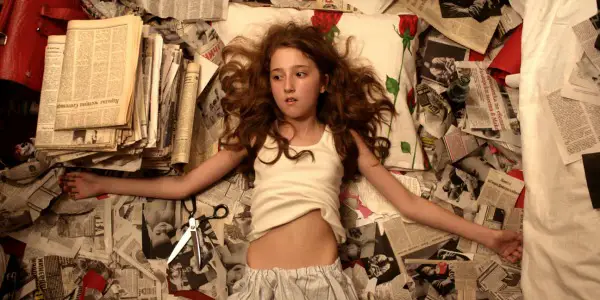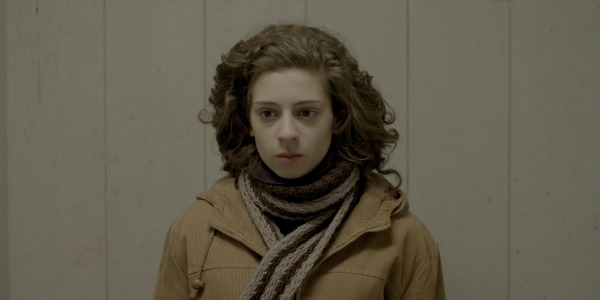VIKTORIA: The Intersection Of History And Motherhood

Arlin is an all-around film person in Oakland, CA. He…
People often tend to demarcate their lives by coordinating them with macro-narratives. For instance, the segment of your life that took place during the George W. Bush administration, or the Vietnam war. This conflation of personal and national narratives can also come from without, as how “Millenials” are typically designated as having “come of age” around 9/11.
For some, this is merely a helpful little memory trick or an unavoidable part of living in a modern, interconnected world. But for others, having their life inextricable bound to world events completely outside of their control creates an oppressive and totalizing effect.
Maya Vitkova‘s debut feature Viktoria is ostensibly a film about motherhood, family and personal identity. Told through three generations of women in a Bulgarian family, the film centers on Boryana, the only figure with the dual roles of mother and daughter in the trifecta. But through the peculiar story of this one family, a compelling critique of government and history reveals itself.
Who am I? Who are you? Who are any of us?
Viktoria begins with stock footage to set a temporal context. Images of Thatcher, the Ayatollah, Mother Teresa, Yasser Arafat and others transport the viewer directly to the end of the cold war era. The clips end with a total solar eclipse, the first indication that the film will be playing with ideas of human history’s construction and fleeting significance, blotting out all of these important world figures with the immensity of the Sun.

When the audience first meets Boryana (Irmena Chichikova), it is post-coitus, and she is rejecting her significant other’s wishes for the act to have resulted in a pregnancy. After he leaves, she proceeds to smoke, douche and jump violently in order to prevent insemination. All that hard work gets her is a daughter born without a belly-button, an abnormality that leads to her being named by the State the “Baby of the Decade”.
This affords her official privileges such as a government-provided apartment and a phone with a direct line to Prime Minister Todor Zhikov (Georgi Spasov), who showers Viktoria with praise and affection, demonstrating propaganda’s power to recontextualize failures, in this case a birth defect caused by attempts at miscarriage, by celebrating them as victories in the official narrative.
Zhikov views Viktoria’s lack of umbilical chord and belly button as being representative of a new Bulgaria, disconnected from the past and needing nothing from its mother. The irony is that it is the other way around, with the mother needing absolutely nothing from her daughter, whose lack of belly button serves as a constant reminder of her mother’s rejection. Boryana can especially do without the attention and luxuries provided to her by the State, which as a political subversive she silently abhors, further deepening the resentment she harbors towards her offspring.
Conversely, Viktoria is a child and as such actually does have needs from the previous generation. Luckily Zhikov and the state are there to fill the role of which Boryana is incapable, even changing her birthday to the anniversary of the socialist revolution, illustrating her preference for a constructed narrative over reality. She is thus first and foremost the daughter of the communist state, which becomes problematic in 1990 when the USSR falls.
All of a sudden, Viktoria is without her surrogate parent, and when she turns to her mother, finds she still has no interest in raising her. Viktoria eventually finds comfort in the arms of her grandmother, whom Boryana has also rejected outright, bridging the gap between the rise of Eastern European Communism and its collapse.

Through all of this, Boryana is merely trying to find out where she fits; her future having been stolen from her by her husband, her daughter and the powers that be. Once the regime changes and Bulgaria transitions to a European democracy, she doubles down on her refusal to play mother to her daughter, now finally having the opportunity to live in a democratic society, an act which causes Viktoria to age significantly in a single jump cut.
The dynamic between these mothers and daughters runs parallel to that of the individual to the state; operating in a continuous ebb and flow of dependence and independence. While Viktoria knows not the sins of her grandmother, and she in turn bears no resentment to her granddaughter but in facts sees her as a chance at redemption, Boryana is stuck in the middle, unable to forgive her mother for her failures as a parent, and unable to truly love her daughter for limiting her opportunities as an individual.
Politically, these relationships reflect the dilemma of her generation of Bulgarians; the previous generation recognizes their faults and seeks to reconcile with the new, but she can neither forgive her predecessors for establishing the State regime, nor can she embrace those who follow her, unappreciative of what their freedom means without any context of the oppression of individuality.
If Boryana is no longer in opposition to the state due to its adoption of a Western style of government, then what is she? The only roles left for her to embody are ones that feel like capitulating and self-imprisonment; that of daughter and mother. Where she ends up on this decision is ambiguous, as the film offers the audience hope that she can embrace her family, and by extension her country, but with the knowledge that cycles, both personal and historical, have a tendency to repeat themselves.
Surrealism In Post-Soviet Bulgarian Reality
In addition to its compelling themes, Viktoria is visually stunning. Utilizing an understated palette, Vitkova and cinematographer Krum Rodriguez compose frames both uncluttered yet rich in information and impact. The commonplace reality of post-Soviet Bulgaria provides a perfect setting against which to insert Viktoria‘s playfully inventive surrealist moments, such as when the title character is pushed over into the snow by a giant hand.
Most of the film is shot indoors, but when outside the camera often takes a bird’s eye view, illustrating the fallacy of Communism; we are all alone, there is hardly a collective beyond the realm of myth. The first break of this theme comes during a pro-democracy rally, which is depicted as a endless sea of people waving blue flags, amongst them Boryana, finally seeming to open herself up to something.

The director’s nieces Daria and Kalina Vitkova offer compelling child performances as Viktoria at different ages. Younger Daria is especially impressive, as it is put upon her to carry the character’s shift in tone, which she accomplishes rather seamlessly. But the film really succeeds on the shoulders of Irmena Chichikova‘s masterful performance, which is instantly iconic even with very little dialogue; her command of body language and facial expression is an inspiration.
Drifting through the film often depressed and dead-eyed, you still empathize with Boryana, despite her cold demeanor towards her only child. She did not ask for any of this, it was forced upon her, despite her best efforts. This is a depiction of a kind of motherhood familiar to millions of women, unplanned and unwanted, yet totalizing and inescapable.
Conclusion
Viktoria joins the ranks of recent films like We Need to Talk About Kevin and The Babadook that have the gall to present motherhood as anything other than idyllic, subverting the patriarchal narrative that it is a woman’s ultimate purpose. The film’s epitaph, “to my mother”, seems like a borderline provocation in the context of Viktoria.
At two and a half hours it is not necessarily a breezy watch, but it is a dense and rewarding one, and I feel as though I’ve hardly scratched the surface of this film here. Difficult to classify, with shifting protagonists and a healthy dose of magical realism”, Viktoria plays a bit like a Gabriel Garcia Marquez novel, defying Hollywood narrative conventions of pacing, genre and characterization.
But it’s also a film that speaks on a universal level, one that commands an understanding that transcends language and national ideology. A debut feature announcing a new major talent on the world stage in Vitkova, Viktoria is a family epic, told with pathos, humor, honesty and humility, and is possibly the most inventive and singular film I’ve yet to see this year.
Do you feel like an official narrative intrudes on that of the individual?
Viktoria opens today (April 29) at the IFC center and Lincoln Plaza Cinemas in New York and gets its West Coast premiere on June 10. Find other release dates here.
Does content like this matter to you?
Become a Member and support film journalism. Unlock access to all of Film Inquiry`s great articles. Join a community of like-minded readers who are passionate about cinema - get access to our private members Network, give back to independent filmmakers, and more.
Arlin is an all-around film person in Oakland, CA. He received his BA in Film Studies in 2010, is a documentary distributor and filmmaker, and runs Drunken Film Fest Oakland. He rarely dreams, but the most frequent ones are the ones where it's finals and he hasn't been to class all semester. He hopes one day that the world recognizes the many values of the siesta system.













